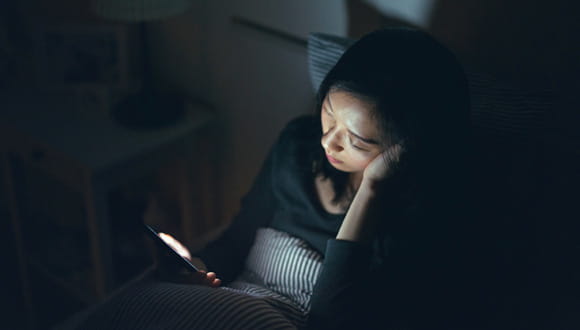We’re like moths to a flame when it comes to our devices. Whether it’s a TV, smartphone, tablet, laptop or handheld video game, our homes are full of screens to stare at — even some refrigerators have interactive displays these days.
We turn to these devices throughout the day for news, to find answers to questions, for entertainment, and to keep up with friends, family and even people we’ve never met. But you may want to think twice before using your smart phone and devices before bedtime.
“Anything on a screen typically stimulates us more than it relaxes us,” says Dr. Randall Wright, a neurologist at Houston Methodist. “And when we’re stimulating our brains before bedtime, there can be consequences.”
If you find yourself staring at a screen or device right before bedtime, consider asking yourself a few questions.
Is this actually relaxing me?
When we interact with and watch things on our devices, it may not feel mentally or emotionally stimulating, but it is.
Check this out. Do this. Find out how. Read this next.
“Scrolling through Facebook is very different than reading a relaxing book.” says Dr. Wright. “And our bedtime routine should be the things we do to wind down, not stimulate us.”
Dr. Wright says that a lot of the content on our devices peaks our interest and mind instead of relaxing us. This means that instead of letting our brains wind down, we’re stimulating them.
How is this affecting my mood?
It might be the comment someone left on your social post, or a photo of your friends hanging out without you, or even a work email from your boss — whatever it is, what you look at before bed can affect the mood you’re in when you fall asleep.
“Socially, what’s going on in your mind when you’re interacting with your device?” Dr. Wright asks. “The content you’re looking at can definitely affect your mood, and maybe now you’re going to bed feeling anxious, upset, lonely or stressed.”
We grab our phones or tablets in the context of it being relaxing, but, in reality, most of the time it ends up stimulating our brains or affecting our emotions instead.
How is this affecting my sleep?
We’ve all been there. Even though you know it’s time for bed, one cute dog video turns into 10 cute dog videos and some unplanned online shopping.
The fact is: Screen time before bed is a distraction, particularly from sleep.
“Lack of sleep can definitely affect how we feel the next day,” says Dr. Wright. “If we’re sleep deprived, we tend to have more problems remembering things, we’re usually more irritable and we can also have difficulty concentrating.”
And some of us turn to our devices when we wake up in the middle of the night, which Dr. Wright strongly warns against.
“It’s normal to wake up several times throughout the night, and usually we fall back asleep in about 10 to 15 minutes,” says Dr. Wright. “But sometimes we get anxious about falling back to sleep, and so we grab a device or put the TV on. This habit is bad because it perpetuates our wake period, turning what could’ve been a 15-minute arousal into a 30- to 45-minute one, or longer.”
Then there’s the question of whether basking in the blue light these devices emit makes the sleeping problem even worse.
“There’s also the potential question of whether the specific frequency of light emitted by these devices might stimulate our brains,” explains Dr. Wright. “It’s still somewhat debatable — but there’s a question about it.”
Do I have the willpower to put this device down?
“The real issue isn’t necessarily the device, but the reason you’re looking at it,” Dr. Wright explains. “Is there a reason you need your phone at night time?”
This is the biggest question when it comes to screen time before bed, and screen time in general — and it’s one a lot of us probably try to ignore.
Screen time before bed can be a pacifier of other mental or social issues, like phone addiction and insomnia.
“Your device enables you to run your list of things to do or distracts you from the frustration of not being able to sleep, but it doesn’t actually solve either issue,” Dr. Wright explains. “If you can’t turn your mind off at night, your device is perpetuating that issue, not helping to solve it.”
Tips to reduce screen time before bed
“A great bedtime routine is one where we start to relax and wind down, versus doing something that is stimulating and arouses us,” says Dr. Wright.
To relax before bedtime, Dr. Wright recommends:
- Avoiding devices for the 30 minutes before bed
- Taking a warm shower and moving to a cool dark room
- Setting your room up with relaxing lighting and sounds
- Meditating, praying or reading a book
If you find it hard to stay away from your device before bed, Dr. Wright also recommends trying a ‘no phones in the bedroom’ policy, or at least not where it is easily accessible for a quick social media peek.
“Your iPhone has a silent mode, but the real silent mode is not bringing it into the bedroom,” says Dr. Wright.








